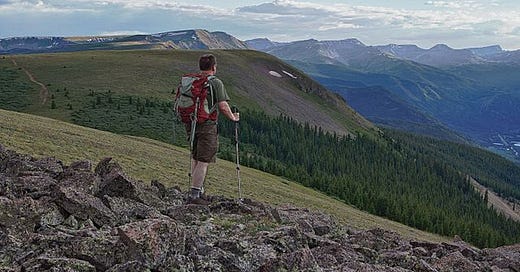It was a struggle. My publisher and I went several rounds before we got to A Voice from the Edge.
Publishing wisdom is that the title is supposed to catch the reader’s interest. The subtitle is a shorthand description of what the book is about.
And there was the rub.
I thought Prozac Monologues was an educational piece about bipolar disorder. She thought it was a memoir. (It’s both.) She won the naming battle. But I found my voice. So it worked.
Eventually, the subtitle made sense. A Voice from the Edge is a mini-memoir in five words.
Edge
I have lived my life on the edge.
The Geography of Edge
I grew up in Colorado, just down the road from the Continental Divide.
The Continental Divide is the backbone of North America. The basic thing to know about the Continental Divide is the water. Every water on the east side of the divide flows to the Mississippi River and from there to the Gulf of Mexico. Every water on the west flows to the Pacific. This is an immutable physical fact.
So maybe you learned about that in geography class and promptly forgot it because—who cares?
Well, I cared. Growing up in a small town—far from any center of power—I knew I lived near something of monumental significance. On a continental scale.
It’s about the water.
Politicians and pundits outside of the west don’t get it, that water is life and drought is death. Their disinterest has consequences farther downstream. In many ways that disinterest is the foundation of the red/blue divide in the United States.
I didn’t know about the politics. But I knew that I lived near the source of the real power. Even though I had none myself.
Other edges on which I have lived: the Mississippi River in Iowa and the Circle of Fire in Costa Rica and Oregon. That second one is about volcanoes. Volcanoes are about creativity. And there began my writing career.
The Culture of Edge
Edge describes my position in the social order, as well.
Red hair, left-handed, smartest kid in school—I stood at the edge of any bell curve out there.
In a Catholic grade school, mine was the only family with multiple marriages, divorces, step-siblings, and half-siblings.
At Reed College, I was one of the few Christians. Among the Christians, I was the non-evangelical.
In the Episcopal Church, I was one of the few who grew up poor and working class, and still struggling financially. I couldn’t really afford the crowds I hung out with. —Looking at you, General Convention. I spent my church career “passing.”
Among liberals, I was the rarity who loved Jesus. I thought there were logical holes in John Spong’s principles. More fundamentally, I think he and his successors just miss the point.
Oh, and then there is the lesbian priest thing. How’s that for living on the edge—a knife’s edge at times. I once did a commitment ceremony for two guys who had no one to invite. Not out to church and family as gay, not out to friends as Christian. I was right there with them.
The Edge of Sanity
So I took all that edginess with me into my mental illness. And decided to know as much about it as my doctors—the “expert patient.” That endeavor turned into Prozac Monologues, the title that needed a subtitle. And again, it put me on the edge. There are a few expert doctors who know that I know my stuff. But I don’t reveal that fact to any new doctors. That would put me on the edge called delusion.
The thing about the edge is that from it, one can see what cannot be seen from the middle. In my case, I can see a few things about politics, about class, about church, and about mental illness. I have something to say. For which I needed to find my voice.
That will be the next installment.
To be continued . . .
A Voice from the Edge is my newsletter. Most of my subscribers came from my first website. (Thank you!) That website has been revamped, and the newsletter transferred to here. I am still working out the relationship between the newsletter and What’s Next, my primary site on Substack. Please bear with me if there are some kinks. Please let me know if there are some kinks.





The edge, and not the middle, is where most interesting things happen.
Beautiful entrée, Willa, candid and elgantly laid out. Metaphors as durable as a coherent homily.
I see you, too, re: the GC. The classism at higher levels of church governance is awkward at best, destructive at worst. A microcosm of state and global governance.
Thanks for this piece!